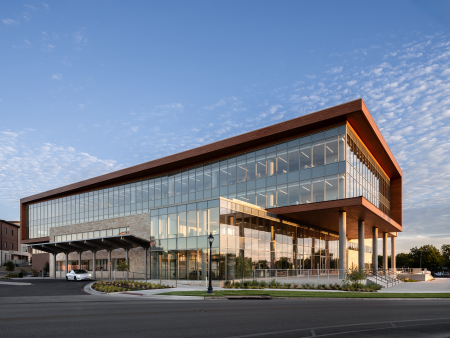
Moody Grant Recipient: Waco Family Medicine
1. Can you share a brief history of Waco Family Medicine and its mission in the community?
Waco Family Medicine (WFM) was founded in 1969 by the McLennan County Medical Society to address a local primary care shortage and improve healthcare access for low-income residents. Established through a coalition of business, political, and medical leaders, WFM remains committed to providing high-quality, comprehensive care to underserved communities. As a Federally Qualified Health Center (FQHC), WFM offers affordable medical, dental, and mental health services, using a sliding fee scale based on income. Through its Residency Program, WFM also trains future family physicians with a focus on compassionate, culturally effective care. Today, WFM serves over 74,000 patients annually across multiple locations in Central Texas.
2. What are some of the most common healthcare needs you address, and how do you ensure accessibility for underserved populations?
Waco Family Medicine provides prenatal care, pediatric services, women’s health, and senior care, ensuring high-quality care for every stage of life. WFM treats patients who face chronic conditions like diabetes, hypertension, and asthma, as well as acute illnesses and preventative care needs. To make healthcare accessible, WFM offers sliding-scale fees based on income, same-day appointments, telehealth visits, on-site pharmacies with affordable medications, and language interpretation services. WFM’s goal is to remove as many barriers as possible so people can get the care they need.

3. Why is it important to provide both clinical services and a residency program?
Waco Family Medicine is home to a nationally recognized (top 2 %) Family Medicine Residency Program, which trains future doctors in community-based, full-spectrum healthcare. By integrating medical education with hands-on patient care, WFM not only develops skilled physicians but also ensures that Central Texas has a steady pipeline of excellent primary care doctors dedicated to serving diverse populations. Many of its graduates choose to stay and practice locally, strengthening healthcare access for the long term.
4. How does Waco Family Medicine integrate mental health and additional wrap-around services into its primary care model?
Waco Family Medicine believes in treating the whole person, not just the symptoms. Mental health professionals are embedded within primary care clinics, making it easier for patients to receive counseling, therapy, and substance use disorder care. Additionally, WFM provides case management, social work support, nutritional counseling, and assistance with housing and transportation needs. These wrap-around services help address the social determinants of health that impact a person’s well-being.

5. What initiatives or programs does Waco Family Medicine offer to promote preventative care and patient education?
Prevention is key to long-term health, and WFM focuses heavily on patient education and wellness programs. Some initiatives include:
- Women’s health services, including prenatal care, well-woman exams, and support for maternal health.
- Pediatric wellness visits, ensuring children receive regular medical, dental and behavioral health check-ups for healthy development.
- Chronic disease management through care managers to provide support, education and resources for conditions like diabetes, hypertension, COPD, and heart disease.
- Community health outreach and educational events to promote wellness and preventive care.
By empowering patients with knowledge and resources, WFM helps them take control of their health.
6. Tell us more about your relationship with the Moody Foundation.
The Moody Foundation’s support has been instrumental in advancing Waco Family Medicine’s mission. Their funding in 2019 enabled us to launch a groundbreaking stepped-care intervention for children experiencing trauma-related behavioral challenges, significantly expanding access to evidence-based treatments in primary care. This partnership established a foundation of trust and demonstrated our shared commitment to innovative, community-driven healthcare solutions. As we embarked on the development of our new Central site, we felt confident that the Moody Foundation would be aligned with our vision—ensuring all Texans have access to high-quality, comprehensive care. Their investment in our work has not only transformed pediatric behavioral health services but also strengthened our ability to serve the broader Waco community through expanded facilities and integrated care models.
7. What do you see as the biggest challenges and opportunities for community healthcare in the coming years?
The nation spends over $4T each year on health care, but it underinvests in primary care – the aspect of the health care delivery system that reliably improves population health outcomes like life expectancy and disease prevention while lowering costs. Although 35% of visits in health care are delivered in primary care settings in the US, only 5% of overall health care dollars are spent on primary care. And even primary care is not equally distributed, with rural communities and underserved / high-density urban neighborhoods having the least access across the state and country. Community health centers (FQHCs), which are private, nonprofit organizations run by a local patient-majority board, offer high-value care to those who need it the most.
Health care systems nationwide are facing rising costs due to inflation, and in states like Texas, safety net organizations are struggling due to the high uninsurance rates in the state. Following the end of the public health emergency, the state’s approach to Medicaid unwinding left millions without coverage and created additional challenges for safety net health care systems. Organizations like Waco Family Medicine are adapting by streamlining processes and expanding partnerships to sustain high-quality care. Health care providers are working to reconnect eligible patients with coverage while expanding financial assistance to ensure continued access. Other states have safety net resources lacking in Texas, which makes partnerships with philanthropy crucial for survival.

8. Upcoming events or key milestones we should highlight?
Waco Family Medicine is expanding its pharmacy services, ensuring that affordable medications are available at more locations. Pediatrics is getting its own hotline to better serve the needs of our youngest patients with same-day care. WFM will also be celebrating Black Maternal Health Week in April with numerous events to recognize resilience and strength in the face of daunting and well-documented outcome disparities faced by Black mothers. Further expansion in pediatric mental health screening and management are in pilot phase and will be expanded across the center to address the rapid growth in prevalence of pediatric and adolescent mental illness. Waco Family Medicine is always learning, growing, and adapting to meet community needs.




